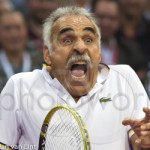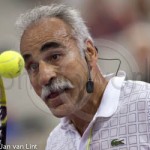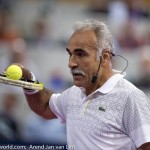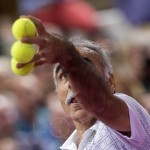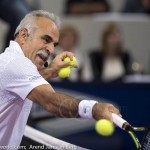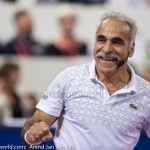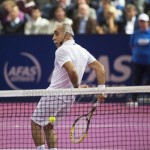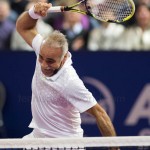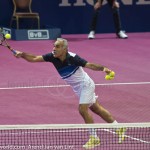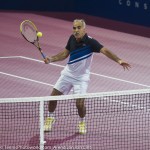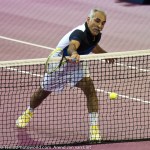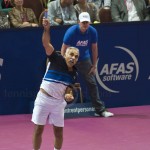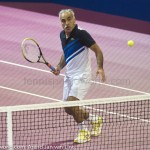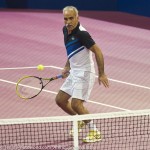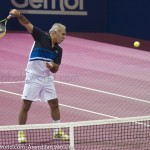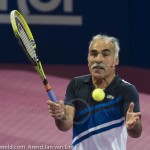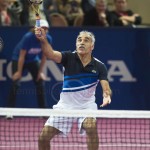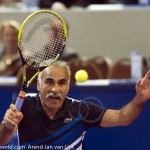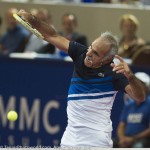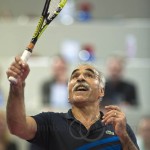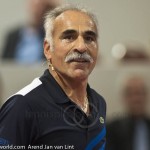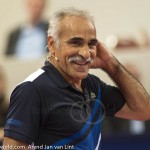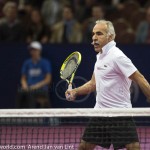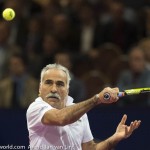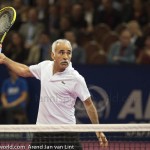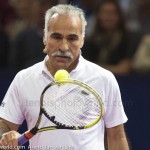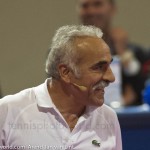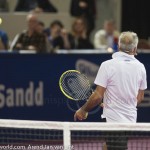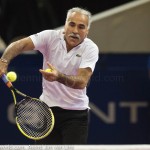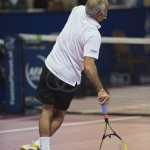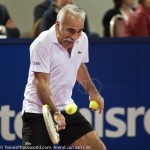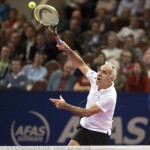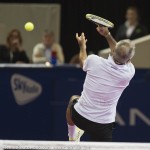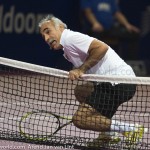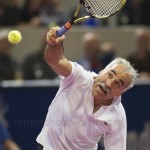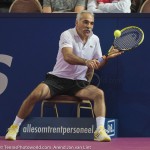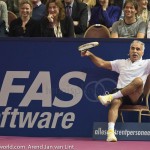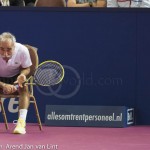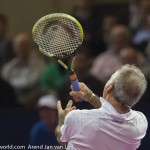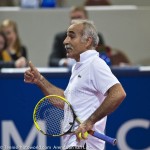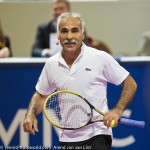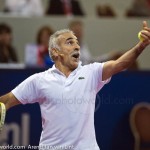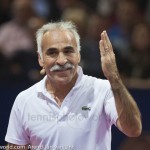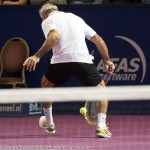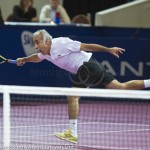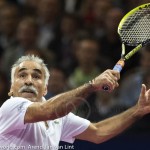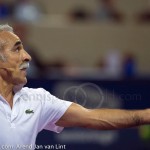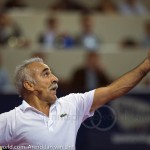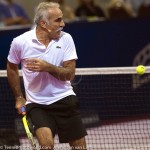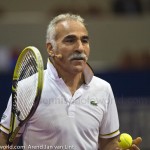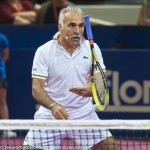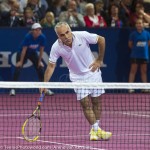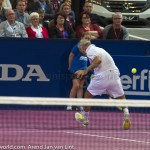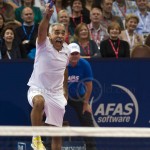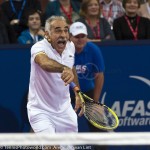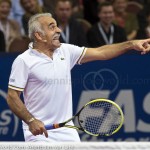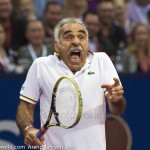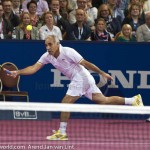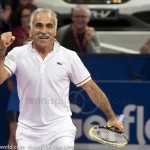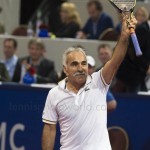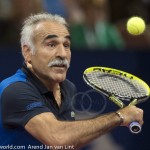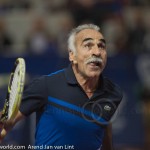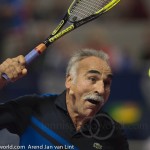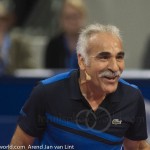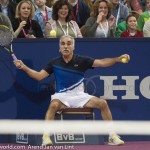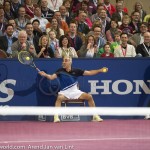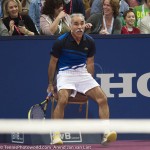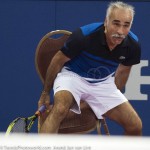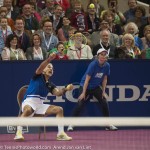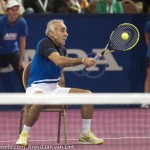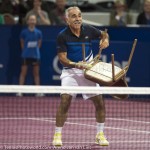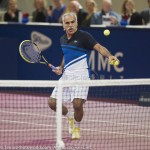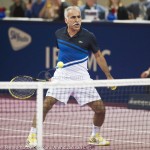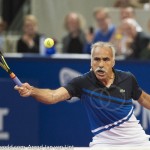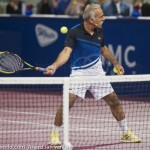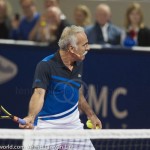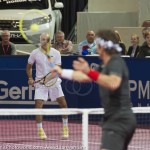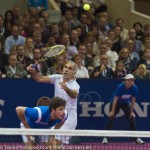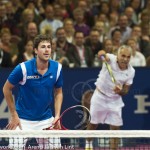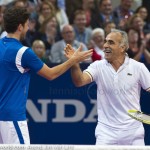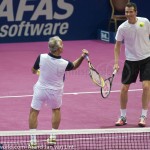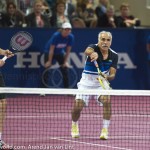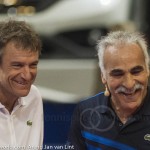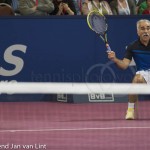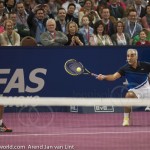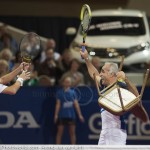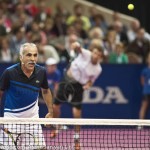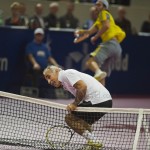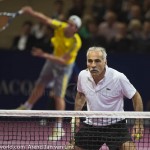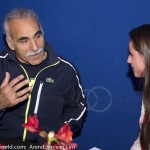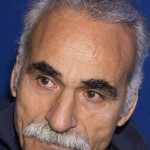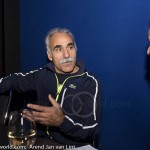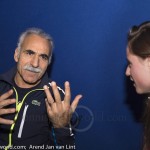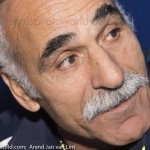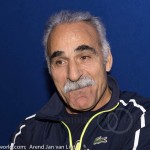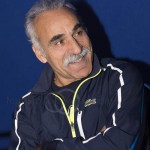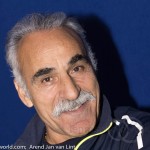You will never forget his story: Mansour Bahrami
Playing Davis Cup for his country, while being prohibited to play tennis till the age of thirteen. Living on the streets of Paris to be a tennis player. Having nothing to eat and no place to sleep and still tell other people that everything is perfect, because he did not want to bother others with his problems. Reaching the doubles finals of Roland Garros without one single tennis lesson or a coach. Being one of the most talented players ever, while his father never saw him play. Despite his troublesome career still feeling one of the luckiest men on earth. Meeting his wife at twelve hour clock on New Year’s Eve when getting out of his car to spontaneously wish this beautiful woman a happy new year. And at the age of 59 still being the most asked for exhibition player in the world who has always cared more about giving other people a good time than about winning the match. Quite a remarkable man he is, who made time for this exclusive interview at the AFAS Tennis Classics: Mansour Bahrami!
A dream to hold on to
‘Magician on a tennis court’, that is how you can best describe Mansour Bahrami. A player who interacts with the audience and drives his opponents crazy with astonishing racket work, flamboyant skills and funny and inventive shots. If you watch this legend play you wonder and laugh, that’s a fact. It’s hard to imagine that he played like this as a professional tennis player as well. “Yes, I always played the same way. When I played for example in Hamburg against Boris Becker (number one in the world at that time), the German people where all for me. This made Becker very nervous. I probably lost hundreds of matches that I should have won, because I really wanted to entertain the crowd. Still, I don’t have any regrets. It has always been important for me to make people laugh and to give them a good time”, Bahrami tells us. It was exactly this love for tennis and entertaining people that gave him the straight to hold on to his dream of becoming a professional tennis player. The dream of a child born in 1956 in Iran that was forbidden to play tennis till the age of thirteen. The dream of a man that once again could not play tennis for more than three years during the Islamic Revolution and who lost the best years of his career between the age of 20 and 30 due to his Iranian passport.
“He gave me a really bad look and broke my racket smashing it on the steps. That might have been the hardest day of my live.”
The story of his first racket
“As a child I used to play with a frying-pan or piece of wood. People would stop, look at me and have a good time”, Bahrami looks back on his childhood. In Iran tennis was a sport for the upper-class. Mansour, the son of a gardener, was only allowed to be a ball boy at the Teheran Racket Club. “Today being ‘just’ a ball boy is probably seen as some kind of slavery, but for me it was great to do this. I was a very happy child”, tells the positive minded Mansour. Than his smile changes into a serious frown. “Do you know the story of my first racket?”, he asks. Yes, the awful story of his first racket. It is almost too cruel to imagine. “When I was twelve years old a tennis player at the club gave me a racket. Next time, when I entered the court to play, I was surrounded by guys within two minutes. They stopped me and one guy took me seven or eight times above his head and smashed me on the ground. I seriously thought he wanted to kill me and that I was going to die. I thought it would be the last day of my live. When I was lying on the ground, covered in blood I looked at the guy who was picking up my racket. I said: ‘please, don’t touch my racket’. He gave me a really bad look and broke my racket smashing it on the steps. That might have been the hardest day of my live”, Bahrami looks back on this horrible event.
“I never had a lesson in my live and I never had a coach. I just watched ordinary people at the club play and that is how I learned to play tennis.”
Playing Davis Cup
When was this talented kid actually allowed to play tennis? Bahrami: “Well, when I was thirteen the tennis federation needed new players. I received two rackets and they said: ‘now you are allowed to play. You can play any time you want and as long as you want’.” The Iranian federation had no program and did not do anything for the professional tennis sport. “I never had a lesson in my live and I never had a coach. I just watched ordinary people at the club play and that is how I learned to play tennis”, explains Bahrami. This way he became world’s number 191 in singles and 31 in doubles, which is unbelievable! “Well, if I would have had a coach, I would not have been allowed to do all the things I do today. He would have said: ‘Stop that and now you play seriously’. In a way I’m happy I never had a coach”, the inspiring Bahrami confesses smiling. Three years later Mansour Bahrami was a member of the Iranian Davis Cup team. For us nowadays it is almost impossible to imagine that you play the Davis Cup for your country and aren’t being watched and supported by your own parents just one single time. “No my parents were never there to watch me play. They were happy to let me do what I wanted, but they did not feel in place between all the millionaires who attended the tennis tournaments. My father was proud of me, but he never saw me play. My mother saw me play in France, not in Iran. The system was like that in our country”, Bahrami explains. Did it hurt him? “Yes, I suffered from that. I love my father and my mother so much, but for me it was not always easy to understand why they could not come to see me play.”
“Yes, I suffered from that. I love my father and my mother so much, but for me it was not always easy to understand why they could not come to see me play.”
Go home to do what!?
So the young Bahrami was not allowed to play tennis till the age of thirteen and made it into the national Davis Cup team without a single tennis lesson or his parents there to support him. It would only seem fair that from that moment on the extremely talented boy would have been given the chance to realise his dream to become a professional tennis player. However, the hardest days of his career were still to come. At the end of the seventies during the Islamic Revolution in Iran professional sports, including tennis, were forbidden. For three and half years Mansour was not allowed to play in Iran, nor could he leave the country. Although his first year in Paris was hard and a continuous struggle to survive, these years being stuck in Iran are the only ones Bahrami looks back on with bitterness in his voice. “In the news I saw players whom I had beaten become number 15 or 20 of the world and I could not play. That was very frustrating.” As soon as he had an opportunity to leave Iran he went to France. This happened in July 1980 after a few tennis players had managed to organise one tennis tournament in Iran: ‘the Revolution Cup’. Bahrami won the singles and doubles and received a ticket for a trip to Athens. Generous as he was, he gave the ticket to his girlfriend so that she could go on a nice holiday. However, two days later she said: “No, it is best if you go and after that you can maybe go to France and if the things go right and you can stay there than maybe I will come as well”. In the end, she never came to France, but Mansour somehow managed to survive his first year in Paris. “It was very difficult. I didn’t speak the language, I was illegal and hiding from the police, I was homeless and sometimes I did not even have anything to eat. I walked all nights through the streets of Paris and I went to Roland Garros to sleep on a sofa for a couple of hours.” Living in a situation like this, many people would have given up on their dream. But not this inspiring personality. Bahrami: “I had no choice. Tennis was my love, my dream and the only thing I wanted and could do. Many people in my place would have given up and have gone home. But go home to do what!? Since I could not play tennis in Iran I would probably have been forced to clean the streets or something”.
“It was very difficult. I was illegal, homeless and hiding from the police. Yes I was hungry, but I kept my mouth shut. I had to do it my way and find a way to stay in France without bothering anybody.”
Mansour, is that you!? I thought you were dead!
Mansour is a kind man and people were willing to help him, but he did not ask for help nor accept is. “I never came to France to be a pain for other people. I never asked for free money, never asked for money from the government. Yes I was hungry, but I kept my mouth shut. I didn’t ask anybody anything”, tells Bahrami. One day when Bahrami was at Roland Garros he met Guillermo Vilas and Ilie Nastase. “When Nastase saw me he said ‘Mansour is that you!? I cannot believe that it is you. I thought you were dead!’. Villas asked me how I was and if he could do anything for me. My answer? ‘No, everything is perfect.’ I had slept in the streets for three months and I swear to God that I had nothing to eat that night and I had no place to sleep. Nothing was right and nothing was perfect! But I said to him that everything was good, because I had to do it my way. If I would have told him that I had no place to sleep, he would have offered me a room and would have told me to stay for a while. But that was the easiest way. I could not accept that. I had to do it my way and find a way to stay in France without bothering anybody”, Bahrami tells us.
“I saw this as my only chance. A journalist came to me and said that he wanted to have a press conference with me.”
The man to beat, stuck in France
Bahrami was convinced that he would be able to get out of his difficult situation. “I just needed a good opportunity. And this opportunity was given to me when I received a wildcard for the French Open and I indeed qualified there in 1981.” Mansour managed to stay in France, but due to his Iranian passport he could not play tennis tournaments abroad. “For six years I just played tournaments in France and I was the man to beat there. Even the better players could not beat me. But the ATP tournaments in France alone were not enough to be well ranked.” The fact that Bahrami reached the third round in the doubles of Roland Garros in 1987 and the press started to write about him provided him with the real opportunity he needed. Bahrami: “I saw this as my only chance. A journalist came to me and said that he wanted to have a press conference with me. In those days Iran was in the news every day and he wanted to know more about my situation. ‘What is your problem?’, journalists asked me. I said: ‘I am illegal. I don’t have papers and the French government wants to kick me out. And all I want to do is to play tennis’. The journalists helped me a lot and using the newspapers, the television and radio, my story was finally told. A week after the French Open the same guy who was telling me to leave France gave me the permission, the residence card, to stay in French for ten years”. The man who never gave up had never been this close to realising his dream of living the life of a professional tennis player on the ATP tour. He could not yet get visa’s for all countries, but that changed when he finally received the French citizenship and passport in 1989 after he played the doubles final of Roland Garros. At the age of 33 he finally was a free man ready to travel and to entertain tennis fans all over the world with his huge talent and practical jokes.
“I really try to be a happy man, but when I do not play for a few weeks I get very sad and start questioning myself.”
The luckiest man alive
Was playing the final of Roland Garros the most beautiful moment of his career? “Well, it is true that winning two ATP doubles titles and playing the finals of the French Open and the Master Series in Paris are good memories. But every time I’m on a tennis court I feel like the luckiest man alive. When I see people smile when they see me play and kids ask me ‘Mansour how do you this and how do you do that?’ I get a great feeling and it’s this crowd that gives me the energy to continue to play”, answers Bahrami. Mansour has always preferred to use inventive creative shots above the rational conservative and safer way of playing tennis. Therefore it is not surprising that it was rather easy for him to leave the ATP tour in 1993 and to start playing on the Champions Tour and focus on playing exhibition matches. “I could have played two or three more years in the circuit. However I was so much in demand with the exhibitions that I even had to lose official ATP matches, because I had to play an exhibition elsewhere.” Since the born-entertainer did not want to play that way he followed his passion once again and today he is still the most demanded exhibition player in the world. However, this flamboyant man on court is also quite shy and does not ask anybody for anything. “I really try to be a happy man, but when I do not play for a few weeks I get very sad. I start questioning myself and wonder if tournament directors are going to call me. Not playing is very painful for me and I cannot image to quit tennis. I know I am a very lucky and privileged man. Not many people can say that they played until the age of 59. And I have not even won a Grand Slam”, he tells laughing.
“Since it was midnight I came out of my car and I wished her a happy new year and kissed her. I never thought I was going to marry her.”
Play tennis and enjoy!
His live outside the tennis court? “I love my boys, my dog and my wife. We’re married for 33 years now and to be honest I don’t have to see my lovely wife every day. I miss her when I’m not with her, but I prefer being alone sometimes”, Mansour confesses. One last remarkable story about this man is how he met his wife in a romantic way. Mansour: “It was on December 31th in 1981 at 23.57 at the Champs-Elysées. I asked her if it was true that people kiss each other happy new year. Since it was midnight I came out of my car and I wished her a happy new year and kissed her. I never thought I was going to marry her”. They married three years later. Looking at this story, his live and his way of playing tennis he makes the impression to be an impulsive person. “No, I am very shy. Sometimes I saw a beautiful woman and I did not talk to her and I regretted it afterwards”, Mansour tells us. What would this inspiring tennis legend like to tell tennis players, young and old all around the world? Mansour Bahrami: “Play tennis and enjoy! If you make it to the top level, great. And when not, just enjoy your time on the court. And also without being number 1 or 50 of the world, you can have a pretty good time on a tennis court!”.
You can see the full pictures and slide show.
Click on any photo and the pictures will be more beautiful!



